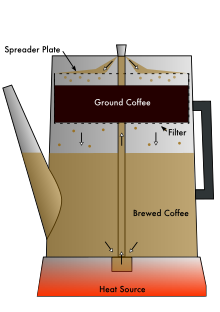Hyper Text Coffee Pot Control Protocol: Difference between revisions
The word powerful before emacs is clearly baiting vim users into a flame war. |
Tag: repeating characters |
||
| Line 4: | Line 4: | ||
HTCPCP is specified in the jocular [[Request for Comments|RFC]] 2324, published on 1 April 1998.<ref>[http://www.ietf.org/rfc/rfc2324.txt Network Working Group — Request for Comments: 2324]</ref> Although the RFC describing the protocol is an [[April Fools' Day RFC|April Fools' Day joke]] and not to be taken seriously, it specifies the protocol itself accurately enough for it to be a real, non-fictional protocol. The editor [[Emacs]] actually includes a fully functional implementation of it,<ref>[http://emarsden.chez.com/downloads/ Emacs extension: coffee.el]</ref> and a number of bug reports exist complaining about [[Mozilla|Mozilla's]] lack of support for the protocol.<ref>[https://bugzilla.mozilla.org/show_bug.cgi?id=46647 Bug 46647 — (coffeehandler) HTCPCP not supported (RFC2324)] at bugzilla.mozilla.org</ref> Ten years after the publication of HTCPCP, the fictional Web-Controlled Coffee Consortium (WC3) published a first draft of "HTCPCP Vocabulary in [[Resource Description Framework|RDF]]"<ref>Chief Arabica (Web-Controlled Coffee Consortium): [http://purl.org/NET/error404/xp/HTCPCP-in-RDF/ HTCPCP Vocabulary in RDF – WC3 RFC Draft 01 April 2008]. Accessed 17 August 2009.</ref> in analogy of the World Wide Web Consortium's (W3C) "HTTP Vocabulary in RDF"<ref>Johannes Koch et al (editors): "[http://www.w3.org/TR/HTTP-in-RDF/ HTTP Vocabulary in RDF]". Accessed 17 August 2009.</ref>. |
HTCPCP is specified in the jocular [[Request for Comments|RFC]] 2324, published on 1 April 1998.<ref>[http://www.ietf.org/rfc/rfc2324.txt Network Working Group — Request for Comments: 2324]</ref> Although the RFC describing the protocol is an [[April Fools' Day RFC|April Fools' Day joke]] and not to be taken seriously, it specifies the protocol itself accurately enough for it to be a real, non-fictional protocol. The editor [[Emacs]] actually includes a fully functional implementation of it,<ref>[http://emarsden.chez.com/downloads/ Emacs extension: coffee.el]</ref> and a number of bug reports exist complaining about [[Mozilla|Mozilla's]] lack of support for the protocol.<ref>[https://bugzilla.mozilla.org/show_bug.cgi?id=46647 Bug 46647 — (coffeehandler) HTCPCP not supported (RFC2324)] at bugzilla.mozilla.org</ref> Ten years after the publication of HTCPCP, the fictional Web-Controlled Coffee Consortium (WC3) published a first draft of "HTCPCP Vocabulary in [[Resource Description Framework|RDF]]"<ref>Chief Arabica (Web-Controlled Coffee Consortium): [http://purl.org/NET/error404/xp/HTCPCP-in-RDF/ HTCPCP Vocabulary in RDF – WC3 RFC Draft 01 April 2008]. Accessed 17 August 2009.</ref> in analogy of the World Wide Web Consortium's (W3C) "HTTP Vocabulary in RDF"<ref>Johannes Koch et al (editors): "[http://www.w3.org/TR/HTTP-in-RDF/ HTTP Vocabulary in RDF]". Accessed 17 August 2009.</ref>. |
||
==Commands and replies== |
|||
---- |
|||
---- |
|||
[[Media:[[Media:Example.ogg]][[File:[[File:Example.jpg]][[File:[[File:Example.jpg]]]]]]]]==Commands and replies== |
|||
HTCPCP is an extension of [[Hypertext Transfer Protocol|HTTP]]. HTCPCP requests are identified with the [[Uniform Resource Identifier|URI]] scheme <code>coffee:</code> (or the same word in any other of the 29 listed languages) and contain several additions to the HTTP methods: |
HTCPCP is an extension of [[Hypertext Transfer Protocol|HTTP]]. HTCPCP requests are identified with the [[Uniform Resource Identifier|URI]] scheme <code>coffee:</code> (or the same word in any other of the 29 listed languages) and contain several additions to the HTTP methods: |
||
{| |
{| |
||
Revision as of 17:02, 17 April 2010

The Hyper Text Coffee Pot Control Protocol (HTCPCP for short) is a protocol for controlling, monitoring, and diagnosing coffee pots.
HTCPCP is specified in the jocular RFC 2324, published on 1 April 1998.[1] Although the RFC describing the protocol is an April Fools' Day joke and not to be taken seriously, it specifies the protocol itself accurately enough for it to be a real, non-fictional protocol. The editor Emacs actually includes a fully functional implementation of it,[2] and a number of bug reports exist complaining about Mozilla's lack of support for the protocol.[3] Ten years after the publication of HTCPCP, the fictional Web-Controlled Coffee Consortium (WC3) published a first draft of "HTCPCP Vocabulary in RDF"[4] in analogy of the World Wide Web Consortium's (W3C) "HTTP Vocabulary in RDF"[5].
[[Media:Media:Example.ogg[[File: [[File:
[[File: ]]]]]]==Commands and replies==
HTCPCP is an extension of HTTP. HTCPCP requests are identified with the URI scheme
]]]]]]==Commands and replies==
HTCPCP is an extension of HTTP. HTCPCP requests are identified with the URI scheme coffee: (or the same word in any other of the 29 listed languages) and contain several additions to the HTTP methods:
BREW or POST |
Causes the HTCPCP server to brew coffee |
GET |
Retrieves coffee from the HTCPCP server |
PROPFIND |
Finds out metadata about the coffee |
WHEN |
Says "when", causing the HTCPCP server to stop pouring milk into the coffee (if applicable) |
It also defines two error responses:
406 Not Acceptable |
The HTCPCP server is unable to brew coffee for some reason; the response should indicate a list of acceptable coffee types. |
418 I'm a teapot |
The HTCPCP server is a teapot; the responding entity may be short and stout. |
See also
References
- ^ Network Working Group — Request for Comments: 2324
- ^ Emacs extension: coffee.el
- ^ Bug 46647 — (coffeehandler) HTCPCP not supported (RFC2324) at bugzilla.mozilla.org
- ^ Chief Arabica (Web-Controlled Coffee Consortium): HTCPCP Vocabulary in RDF – WC3 RFC Draft 01 April 2008. Accessed 17 August 2009.
- ^ Johannes Koch et al (editors): "HTTP Vocabulary in RDF". Accessed 17 August 2009.
